Previously... at White Hart Lane
Things were settling down at university for me as I was discovering a bunch of friends who all shared my passion for football. I was drinking too much, of course, and had recently bet my old mate Boro £10 that I could stop drinking - but after four days, decided to call the bet off. I convinced myself I'd proved my point. I could stop drinking, if I wanted to.
Ironically, the news headlines on the day of the Bolton game were all about Britain's relationship with Europe. Labour leader Jim Callaghan had visited President Giscard d'Estaing in Paris and discussed joining the European Monetary System.
The top 20 that week rings lots of nostalgic bells for me. Boomtown Rats' "Rat Trap" had been knocked off No 1 by surely the cringiest song of the 1970s, Rod Stewart's "do ya think I'm sexy?"
No.
But for me, and I suspect millions of others, here was someone who definitely ticked that particular box... Debby Harry and Blondie.
Having just seen the film "Bohemian Rhapsody" (really good, I thought) it was interesting to note that their song "Fat Bottomed Girls" (surely one of their worst) was also in the charts that week...
The Run Just Keeps Going
Anyway, back to football and after Forest's great win at Spurs on 11th November, I watched a very frustrating affair at home to QPR (yet again). Forest were well below par and struggled through to earn a 0-0 draw against a team they surely would normally have beaten.
Match 285: Nottingham Forest 0 Queens Park Rangers 0 (147th at the City Ground, Saw Forest for the 207th time, QPR 7th)
Of course, I remember precisely zilch about this game. But I definitely went, presumably in the Trent End.
Here's the match day programme...
Forest fielded the same side that had beaten Spurs 3-1 the week before, although Gemmill and Mills swapped shirts.
Nottingham Forest
1 Peter Shilton, 2 Viv Anderson, 3 Ian Bowyer, 4 David Needham, 5 Larry Lloyd, 6 John O'Hare, 7 Gary Mills, 8 Archie Gemmill, 9 Gary Birtles, 10 Tony Woodcock, 11 John Robertson.
Queens Park Rangers
1 Phil Parkes, 2 David Clement, 3 Ian Gillard, 4 John Hollins, 5 Ernie Howe, 6 Don Shanks, 7 Peter Eastoe, 8 Gerry Francis, 9 Martin Busby, 10 Stan Bowles, 11 Tommy Cunningham.
Attendance 28,032
Here's the Guardian report...
1 Peter Shilton, 2 Viv Anderson, 3 Ian Bowyer, 4 David Needham, 5 Larry Lloyd, 6 John O'Hare, 7 Gary Mills, 8 Archie Gemmill, 9 Gary Birtles, 10 Tony Woodcock, 11 John Robertson.
Queens Park Rangers
1 Phil Parkes, 2 David Clement, 3 Ian Gillard, 4 John Hollins, 5 Ernie Howe, 6 Don Shanks, 7 Peter Eastoe, 8 Gerry Francis, 9 Martin Busby, 10 Stan Bowles, 11 Tommy Cunningham.
Attendance 28,032
 |
| Phil Parkes hardly troubled by big Larry Lloyd |
 |
| Lloyd again offering an aerial threat |
 |
| Tony Woodcock this time |
 |
| Late in the game Tony Woodcock comes close to winning it |
Here's the Guardian report...
In other games that day, Arsenal played out a humdinger of 2-2 draw with Everton, with both teams leading before Martin Dobson equalised for Everton.
And here's a tiny (and poor quality) clip of Tony Currie's goal at Molineaux...
Other matches that day...
So, Forest had a full week off before heading up to the satanic mills of Lancashire for another grim encounter with a team from the North-West.
Bolton Wanderers History
This was actually my third visit to Burnden Park. My first was in the 1975-76 season when Forest had drawn 0-0, and then I went for the Boxing Day encounter the next season, but just a few months later, when Forest got a 1-1 draw to keep their promotion challenge going. That match was game No 1 in John Robertson's amazing run of consecutive games, which would reach 109 at the end of this game.
If you're like me, you get a bit blurry about the geography of the North West and the many football clubs that have long established themselves there.
This region was, of course the very heartland of professional English football and it is no surprise that six of the original eleven league members came from this region, including Bolton Wanderers.
The club was originally started in 1874 (nine years after Forest, note) by the Reverend Joseph Farrall Wright, Perpetual curate of Christ Church Bolton, and the club was therefore originally called "Christ Church F.C." but three years later the club was renamed.
Despite such a long history, and many very successful years, Bolton have never won the league. In fact the closest they have come is 3rd, on three occasions.
The first was in 1891-92, the season before Forest joined the league.
Forest first played Bolton, in League Division One, in the 1892-93 season. It was a home match and Forest won 2-0. Bolton won the away tie, 3-1.
From 1895 until 1997 the club played at Burnden Park, 20 minutes walk from the town center.
 |
| Burnden Park in 1895 |
The ground was even used as the venue for an F.A. Cup Final, in 1901, when Spurs beat Sheffield United to win the cup for the first time.
 |
| Burnden Park - F.A. Cup Final (Replay) venue in 1901 |
Bolton have long been associated with white shirts and blue shorts but it wasn't always like that...
 |
| Bolton's early kits (taken from the excellent www.Historicalkits.co.uk) |
The kit of 1884 was a classic. I would loved to have seen them play in that. They did choose the kit of 1885-1886 to play in during their centenary season though. But from 1891, it became the familiar white shirts and navy blue shorts.
Bolton just had the edge over us in the first 26 encounters before the first world war...
The glory years for Bolton Wanderers were the 1920s.
They finished 3rd in the league again in 1921 and then had a remarkable run of success in the F. A. Cup, winning it three times in six years.
 |
| Bolton 3rd in the League for the second time |
They played (and won) the most famous F.A. Cup Final ever - the inaugural one at Wembley stadium, when an estimated 200,000 or more fans packed into the brand new stadium as no-one had thought to make the game all-ticket. Some of the footage of the day is breathtaking.
 |
| Incredible scenes at Wembley in 1923 |
Almost forgotten in all the drama of the day, Bolton won the cup 2-0 against West Ham United.
The first ever goal scored at Wembley was by Bolton's David Jack, after just two minutes.
 |
| David Jack cored for Bolton at Wembley in 1923 |
Great footage here... (I did a big piece on Wembley for Forest's League Cup Final against Liverpool last season.)
Rare action photography from the match...
 |
| Bolton Wanderers F.A. Cup Winners 1923 |
Bolton continued to challenge for the title and came closest a couple of years later, again finishing 3rd but only three points behind champions Huddersfield Town.
The success kept coming and Bolton won their second F.A. Cup, at a much more controlled Wembley this time, beating local rivals Manchester City 1-0 with a goal from... once again, David Jack.
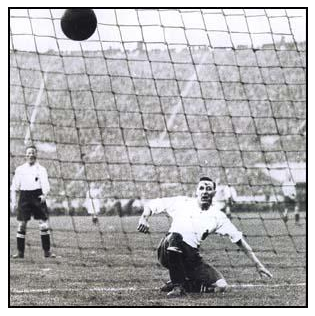 |
| David Jack - again, three years later |
 |
| Cup winners for the second time, three years later |
Bolton were flying at the time and winning the attention of all sorts, including the famous painter L. S. Lowry, who apparently featured Burnden Park (or at least was supposedly inspired by it) in one of his famous works, bought by the Football League museum.
 |
| L.S. Lowry's painting "Going to the match" (1928) apparently featured Burnden Park |
In 1929 Bolton completed their third F. A. Cup win. This time beating Portsmouth 2-0 in the final.
The man behind all this glory was a chap called Charles Foweraker, almost certainly Bolton's most successful ever.
 |
| Charles Foweraker - Bolton's most successful manager |
 |
| For nine seasons - Bolton were second only to Liverpool in the League |
In 1933 Bolton had their biggest ever crowd at Burnden Park. Almost 70,000 squeezed in to see an F.A. Cup tie against local rivals Manchester City.
 |
| Record Crowd at Burnden Park - 69,912 v Manchester City FA Cup, Feb 18th 1933 |
Not surprisingly, Bolton dominated Forest in the inter-war years. Not that we played them much because we were rarely in the first division.
After the war, Bolton continued to play in the top flight. Apparently they had the longest run there for a club that never won it. But disaster struck in the first post-war season when a massive crowd packed into a slightly smaller than before ground (some parts had been requisitioned by the army, apparently) and before the game commenced, a surge on the terraces caused a crush barrier to give way. Hundreds were injured and 33 people were killed.
Amazingly, the game was still played.
 |
| Burnden Park Disaster, 1946 - 33 fatalities |
 |
In the post-war period, Bolton had another great spell largely under the influence of the famous Nat Lofthouse.
|
Bolton, captured their 4th F.A. Cup title, again against one of their big Manchester rivals (this time United) still putting themselves together again after the Munich Air Disaster.
In the team for United that day, Ian Greaves, who would later become one of Bolton's most long lasting managers, and would be in charge on this day.
Two goals from Lofthouse was enough for Bolton that day.
Lofthouse's stats are amazing... 30 goals for England, in just 33 appearances.
Here's a tribute to him after he died in 2011.
Bolton Slump
When Lofthouse retired, so Bolton slumped and they were relegated from the first division in 1963-64. An exile that lasted 15 years, until this (1978-79) one.So, once again, Forest's poor record between the wars has left them looking pretty shoddy in comparison to Bolton who had had the upper hand against us up until the early 1960s.
Overall, the record between the clubs at the end of this day was as follows...
Off to Burnden Park, again
I can't remember how I went to Bolton that day but it was probably, as usual, through a lift with Ian White. It ineveitably involved a stop at a pub in the Peak District on the way back and, judging from my diary entry, it must have involved a return to my Mum & Dad's in Kirkby as Dad dropped my off back at university the next day.
It was a proper old ground, Burnden Park./
Match 287: Bolton Wanderers 0 Nottingham Forest 1 (3rd time to Burnden Park, 208th Forest match, 6th Bolton.)
Here's the programme...
Bolton had a few good players in their side, notably big Sam Allardyce, Peter Reid, Willie Morgan and, of course, Frank Worthington.
The team was built by ex-Manchester united full back, Ian Greaves. He had a reputation (amongst us at least) for parking the bus away from home and I am ashamed to admit that when Bolton played at the City Ground in our promotion season, and he was sat behind us in the Main Stand, we gave him a lot of abuse. In my defence, I was only a kid, but I do feel sorry about that.
 |
| Ian Greaves, Bolton manager |
Martin O'Neill returned for Forest in place of young Gary Mills.
Bolton Wanderers
1 Jim McDonagh, 2 Peter Nicholson, 3 Mike Walsh, 4 Roy Greaves, 5 Paul Jones, 6 Sam Allardyce, 7 Willie Morgan, 8 Peter Reid, 9 Alan Gowling, 10 Neil McNab, 11 Frank Worthington.
Nottingham Forest
1 Peter Shilton, 2 Viv Anderson, 3 Ian Bowyer, 3 Frank Clark, 4 David Needham, 5 Larry Lloyd, 7 Martin O'Neill, 8 Archie Gemmill, 9 Gary Birtles, 10 Tony Woodcock, 11 John Robertson.
Goals : John Robertson 1.
Substitutions: John O'Hare(12) came on for Larry Lloyd (5).
Attendance: 25,692
Here's the report...
Again, no video action could be found of the match but here's a few clips of other games that day...
Leeds beat Southampton 4-0...
The West Midlands derby between West Brom and Villa ended in a 1-1 draw.
Apart from Leeds, not many goals that day as Liverpool continued to set the pace at the top.
That night, the league table looked like this...
With Robbo scoring, he became Forest's current top scorer and was joint tenth in the Division One scoring charts.
West Brom and Arsenal were the teams in top form in the current (last 3 home/away) form table...
And in the 1977-78 1978-79 composite table, Forest's win kept them top of that, with Liverpool snapping at our heels.
42 Up!
But the most significant feature of the day was that Forest had now gone an incredible 42 first division games unbeaten, stretching back almost exactly one year, since they'd lost 1-0 at Leeds United.
Recent form had suggested that they were getting a little weary though and so, with a trip to Anfield coming up soon, it looked ominously unlikely that the run would continue much longer.
 |
| 42 league games without defeat |
If you exclude the F.A. Cup, the run was 57 games in all-but-one competition...
Bolton's Move to the Reebok etc
So, what's happened since?
Most significantly here, apart from Forest's sad demise, was Bolton's departure from Burnden Park to a shiny new ultra modern stadium called the Reebok (but now the Macron) - so much for tradition.
Like many of these soul-less new corporate badged same-looking stadia, it's actually so far out of town that it's almost closer to Wigan than Bolton.
It is attractive, though, I'll give it that.
I went to see them play Hartlepool there in the League Cup in 1998. Bolton won 1-0 but Hartlepool played really well, as I remember.
After just two seasons in the top flight, Bolton were relegated again and plummeted down the leagues reaching their nadir in 1987-88 when they even spent one season in the Fourth Division (although they did win instant promotion back again.)
It's odd looking at that table with Wolves, Cardiff City, Bolton and Swansea City all going up and Burnley nowhere near.
 |
| Bolton's lowest ever league position, 1987-88, 68 places below Forest |
So in the 22 years from Forest winning the league to the end of the millennium, Forest restored our pride over Bolton overall.
And, our record against them 11 v 11, reflected that too...
Just for completion's sake, here are the results of the most recent games between the clubs...
The penultimate encounter listed there was certainly one of the most dramatic between the clubs in recent years as the last gasp Bolton win saved them from relegation.
So this is the overall record between the two clubs as we stand today...
Foot in Both Camps
Obviously several players have played for both clubs. Bolton did a nice piece about this before the most recent game a few weeks ago (which Forest won 3-0).
Here are some of the most well known names they cover...
No 1 on my list has to be John McGovern who had a spell as player manager there after his time at Forest.
 |
| John McGovern - Bolton Boss 1982-85 |
One surprise to me on the list was Peter Shilton, who made two appearances for the trotters.
Perhaps the award to the best player who played a significant number of games for both clubs would have to go to Chris Fairclough. He started his career at Forest, making over 100 appearances for us. Then, after a spell at Spurs and almost 200 appearances for Leeds United, he went to Bolton and made almost 100 appearances for them.
 |
| Brian Clough and Chris Fairclough |
Others on the list will be more familiar to younger fans... Zach Clough, Liam Trotter, Saidy Janko, Matt Mills and Jack Hobbs.







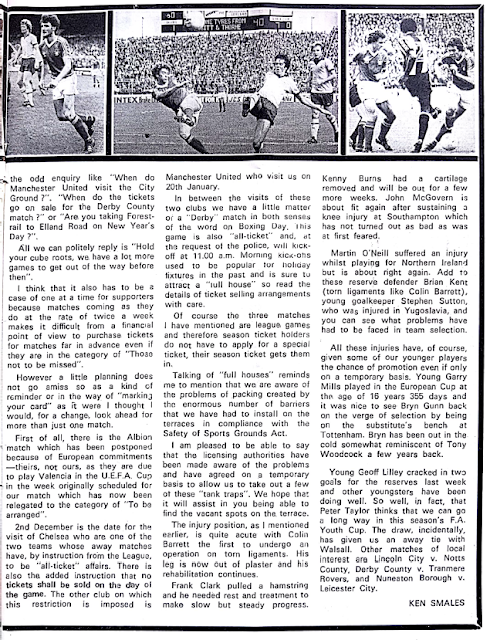







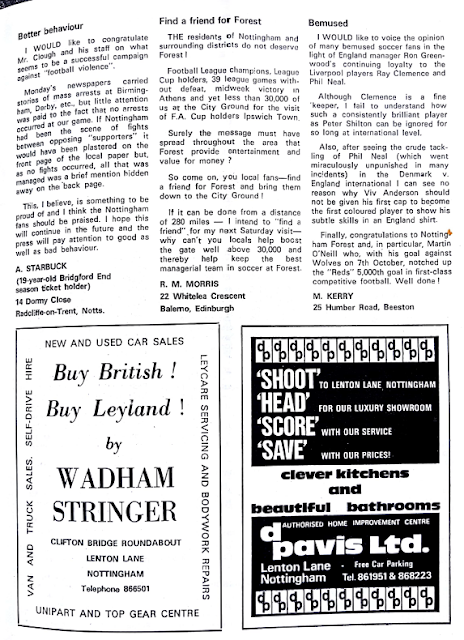

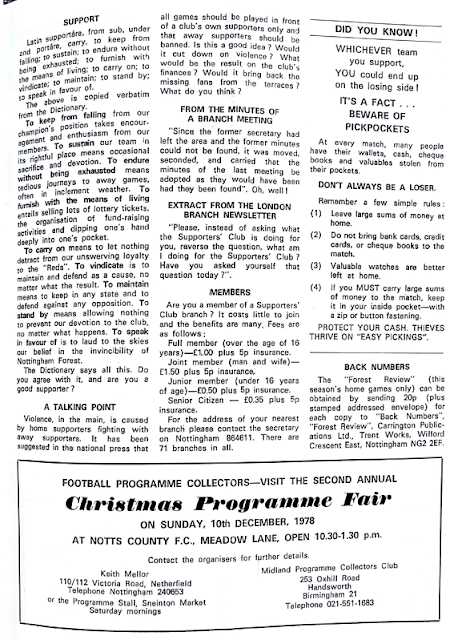


















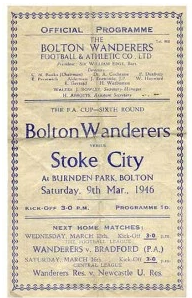



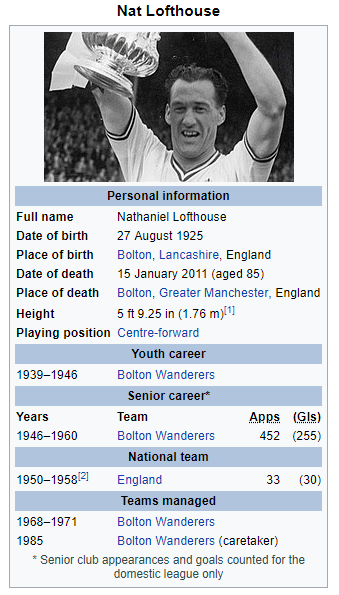













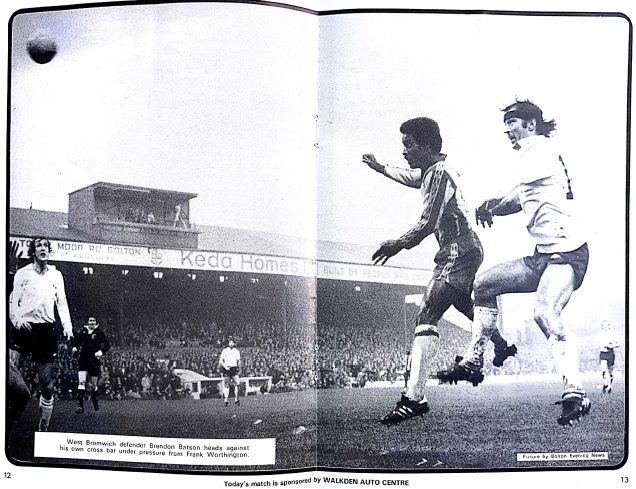
















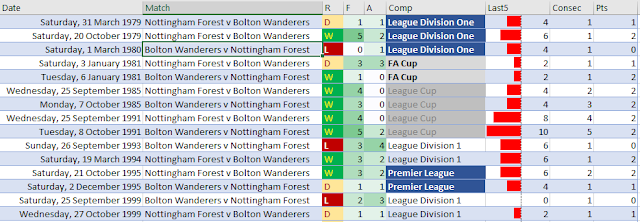



Comments
Post a Comment